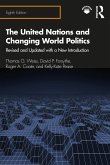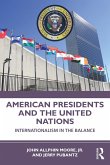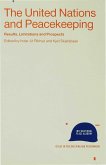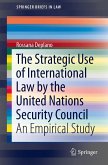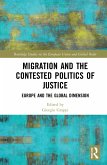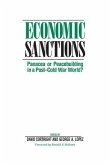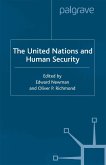The third edition of this successful text highlights new international trends toward global governance, nation-building, and human development, while also assessing the extraordinary challenges confronting the United Nations at this critical moment in international affairs, not least being the ubiquity of conflict in Africa, the Middle East, and Europe, and the global threats of disease, climate change, and the retreat from multilateralism by the great powers. A comprehensive guide to the world body's institutions, procedures, policies, specialized agencies, historic personalities, initiatives, and involvement in world affairs, The New United Nations is organized thematically, blending both topical and chronological explanations, making reference to current scholarly terms and theories.
New to this edition:
Fully updated chapters and a new Introduction, including discussion of the Paris Climate Change Agreement, the world's response to COVID-19, and the revival of ultranationalism and great-power rivalry.
New sections on the theory and practice of neoliberalism and populism, the UN's use of the "Responsibility to Protect" in the Middle East, the Arab Spring, and multifaceted roles in the developing world, especially in Africa.
Updated analysis of twenty-first-century challenges to collective security, including in Syria and, particularly, in Ukraine.
Unique special section on the student Model United Nations experience.
Coverage of the UN's efforts to implement the Sustainable Development Goals.
eResources with supportive materials and documents.
New to this edition:
Fully updated chapters and a new Introduction, including discussion of the Paris Climate Change Agreement, the world's response to COVID-19, and the revival of ultranationalism and great-power rivalry.
New sections on the theory and practice of neoliberalism and populism, the UN's use of the "Responsibility to Protect" in the Middle East, the Arab Spring, and multifaceted roles in the developing world, especially in Africa.
Updated analysis of twenty-first-century challenges to collective security, including in Syria and, particularly, in Ukraine.
Unique special section on the student Model United Nations experience.
Coverage of the UN's efforts to implement the Sustainable Development Goals.
eResources with supportive materials and documents.
Praise for The New United Nations, Third Edition
The authors' writing style is clear and easy to read even for students who are not IR or political science majors. I applaud the authors' recognition of the new role of regional international organizations. The authors' strategy to provide a narrative that grabs students' interest and curiosity in the introduction will engage students to learn more about the dynamism of the UN in the context of twenty-first century peace and security issues, such as terrorism, cyber security, and the seeming intractable poverty, ethnic, gender and development problems in the developing countries.... The book has the potential to serve colleges and universities nation-wide in the United States, and internationally.
Sunday P. Obazuaye, Cerritos College
Accurate and meticulously researched. A well-written, up to-date treatment of the United Nations not only as an intergovernmental institution but also as the embodiment of the rule of law among and within states. Written in plain, easy-to-understand language, the authors aptly describe and fairly assess the strengths and weaknesses of the United Nations as well as the ways it has adapted and continues to evolve in order to meet the monumental challenges that it faces today.
Nikolaos Zahariadis, Rhodes College
The third edition of The New United Nations is a very comprehensive, yet readable, introduction to what the UN is and what it could yet be. The writing is crisp, transporting the reader from global conferences of diplomats into the locales where much of the work of the United Nations is performed. Even though it's intended to be a textbook, it reads in parts like an action thriller. Professors Moore and Pubantz empower readers to understand so they are better prepared to act as informed (global) citizens.
Michael Eaton, National Model United Nations
The authors' writing style is clear and easy to read even for students who are not IR or political science majors. I applaud the authors' recognition of the new role of regional international organizations. The authors' strategy to provide a narrative that grabs students' interest and curiosity in the introduction will engage students to learn more about the dynamism of the UN in the context of twenty-first century peace and security issues, such as terrorism, cyber security, and the seeming intractable poverty, ethnic, gender and development problems in the developing countries.... The book has the potential to serve colleges and universities nation-wide in the United States, and internationally.
Sunday P. Obazuaye, Cerritos College
Accurate and meticulously researched. A well-written, up to-date treatment of the United Nations not only as an intergovernmental institution but also as the embodiment of the rule of law among and within states. Written in plain, easy-to-understand language, the authors aptly describe and fairly assess the strengths and weaknesses of the United Nations as well as the ways it has adapted and continues to evolve in order to meet the monumental challenges that it faces today.
Nikolaos Zahariadis, Rhodes College
The third edition of The New United Nations is a very comprehensive, yet readable, introduction to what the UN is and what it could yet be. The writing is crisp, transporting the reader from global conferences of diplomats into the locales where much of the work of the United Nations is performed. Even though it's intended to be a textbook, it reads in parts like an action thriller. Professors Moore and Pubantz empower readers to understand so they are better prepared to act as informed (global) citizens.
Michael Eaton, National Model United Nations



